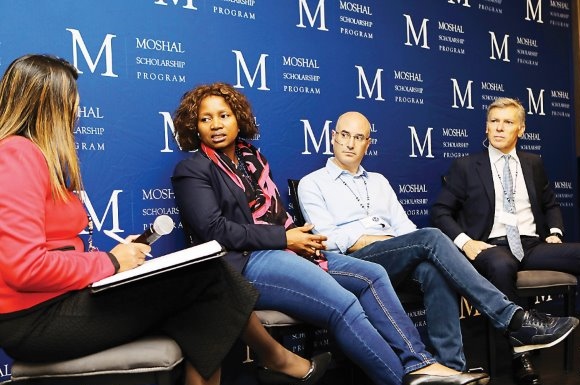
SA

Stop waiting for others to solve our problem, business leaders say
JORDAN MOSHE
It’s only by taking control of the situation ourselves that we can hope to avoid a tumultuous future, the three said at a panel discussion last Friday morning, led by Talk Radio 702’s Joanne Joseph.
The discussion was part of a networking event hosted by the Moshal Scholarship Program. Founded in 2009, the programme is responsible for providing university scholarships for 1 200 students every year.
Guests from across the corporate spectrum came together for a morning of knowledge sharing, networking, and inspirational talks by future Moshal graduates, alumni, and guest speakers.
Self-perception is the key to economic success, said Langeni. “South Africans are innovators, but too often, we undersell ourselves. Our county is a mining giant, and a leader in financial services on the continent. Yes, growth rates are down, but we have something to offer, and continue to be global players.”
Langeni, the executive chairperson of Afropulse and chairperson of Primedia Limited, was appointed by President Cyril Ramaphosa last year to join his special presidential envoy to crisscross the planet looking for investments. Together with former Finance Minister Trevor Manuel, former Deputy Finance Minister Mcebisi Jonas, and former Standard Bank head Jacko Maree, her job is to seek out R1.2 trillion in new investment in the next five years.
She maintains that South Africa has a lot to offer foreign investors, but it’s up to us to promote ourselves and attract foreign interest.
Moshal, who has a background in commercial ventures and investment, agreed with her, but said government corruption rendered any talent we possess useless. “Talent in South Africa is amazing, but the reality is that because the government steals from its people, any talent we have is completely irrelevant.
“South Africans are global players, but they’re not in South Africa. That’s the problem. They go to places where the infrastructure is good enough. If South Africa wants to keep its people, it needs an infrastructure which creates an environment in which people want to stay.”
Moshal explained how this can be achieved. “It’s simple: stop stealing from your people. Provide electricity, and make sure there a high probability you will not be killed in your car on the road. It’s not complicated. What needs to be done in South Africa is obvious. It’s about time that elected officials realise this, and deliver the basics.”
According to Gore, we must stop waiting for the government to resolve these issues, and address them ourselves. He believes the root of our problem is procrastination. “We’re all waiting for better days. The fact is that they’re not coming. We need to make them a reality ourselves.”
Gore said we have the resources available to improve our situation, but we can’t see it because we are too negative in our outlook.
Contrary to popular belief, he maintains the country still has much to lose. “The amount of money stolen by a particular group we all know well was, on estimate, $10 billion to $15 billion (R147.9 billion to R221.8 billion.) The University of the Witwatersrand’s (Wits’) budget is R3 billion a year. This means we could fund Wits, Pretoria, the University of Cape Town, and Stellenbosch for a decade with the money we lost. Just think about what we can lose, and understand the danger we’re really in.”
However, he said attitude drives everything. “We need to move now, and need to move positively. Every country has intractable problems. Look at the United Kingdom with Brexit.
“Our mistake is procrastinating and waiting. We need to move on, and build. We must appreciate what we’ve got. Gauteng’s economy is bigger than Kenya’s or Ghana’s, and 80% of the continent’s pension-fund assets are in South Africa. We must understand what we’ve got instead of having a constant feeling of crisis, saying things are terrible. We’ve got a lot to lose, and we have to understand our potential.”
All three panellists agreed that we need to be more forward looking, believe in ourselves as South Africans, and be willing to take our country to the world and not the other way around.
“Like America, we need to make South Africa great again,” said Langeni. “As South Africans, we need to believe that we can succeed. Our youth needs to believe that the world is their oyster no matter their circumstances or background, and we need to change the narrative so that more people can see it this way.”
Moshal believes that South Africa can be great again. He said there was talent in our midst capable of shaping a better future. “We have to be optimistic, and must maximise resources by providing a better work environment,” he said. “I believe in the South African people, but we need to understand the crisis we’re in. We’ve got to get our house in order.
“The people running this country will be dead in 30 years’ time, and it’s the youth who will take this country forward. South Africa will be great. We hope it will be sooner than later.”




